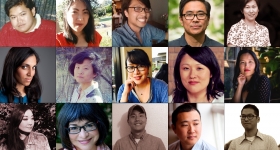For February, we are pleased to present an excerpt from Kirstin Chen's debut novel, Soy Sauce for Beginners, which was released by Amazon Publishing/New Harvest in January.
The novel centers around Gretchen Lin, who escapes her troubled marriage in San Francisco by returning to her childhood home in Singapore, where she must confront the expectations and turmoils of her family.
In this excerpt, which takes place one week into Gretchen's return to Singapore, Gretchen's father and uncle have insisted she join them in hosting potential clients, the Santosos, at the family soy sauce factory. Following a tour of the factory, the Lins lead their guests through a soy sauce tasting featuring both their own premium, artisanal brew as well as the far inferior, yet more commercially successful Yellow River brand for comparison. Despite understanding the importance of this meeting, Gretchen is too distracted by an earlier missed phone call from Paul, her estranged husband, to truly engage with everyone around her.
The excerpt offers a glimpse into Chen's ability to render both food and family with care in this novel.
-- Karissa Chen, Fiction & Poetry Editor
Excerpted from “Soy Sauce for Beginners” by Kirstin Chen. ©2014 by Kirstin Chen. Published by Amazon Publishing/New Harvest January 2014. All Rights Reserved.
My father had led me through my first tasting at the age of six, and every year following, until I reached the age when kids start to hate everything their parents want them to like. Now, eighteen years later, the same impatience I’d felt as a girl of twelve washed over me. I wanted nothing more than to jump out of my seat, return to my desk, and call Paul.
But Ba was going to give our guests the full experience, and because I knew what was at stake for Lin’s, I paid attention.
He flipped up the cap of the Yellow River bottle and poured the sauce into the first compartment. “We start with the lousy stuff,” he said with a wink, and then his face grew serious. He held up the tray and swirled the sauce around with a priest’s solemnity. “You can see how dark that is?” he asked, his eyes narrowing in distaste.
The Santosos studied the tray as if it were a Rorschach test. I, however, knew what to look for. The sauce was dense and opaque and left a brown-black stain on the porcelain like a watery thumbprint.
Ba placed the tray back on the table and instructed the Santosos to lean in. “A bit closer, lah. Get a good sniff.” He took three short deep inhales to demonstrate. Just like a dog, he used to say when I was younger.
James bowed his head, exposing his faux hawk in a manner that struck me as almost vulgar, a too-gummy smile in an otherwise pretty face. I wondered how much gel he slicked on each morning to make his hair stand up that way. I could feel the oily stickiness beneath my palms.
“You too, Xiao Xi,” Ba said, pushing the tray toward me.
I bowed my head, and the sharp, acrid smell of Yellow River made me grimace.
Next, Ba picked up a cracker, dunked its tip in the sauce and indicated that the rest of us should follow. The sauce tasted exactly like it smelled.
“Harsh, flat, one-dimensional. Almost metallic aftertaste,” my uncle said, shaking his head. “Terrible, lah, this sauce. It doesn’t matter how good your ingredients are if you cook with this.”
Ba added, “This isn’t real soy sauce. The color and flavor come from chemical.”
My mother’s voice flashed in my head, her American accent honed over years spent studying in Ithaca, New York. “Chemicals, Xiong,” she corrected. “Chemicals with an s.” Ba often confused the singular and plural, which didn’t exist in Chinese.
Next we moved on to the two bottles of Lin’s soy sauce. My uncle taught the Santosos to take a small sip of each sauce, rolling the liquid over their tongues to experience all the flavors. After the previous mouthful, this sauce was a revelation. Times like this, I understood why my grandfather had risked so much in pursuit of the perfect brew.
“Real soy sauce is as complex as a fine wine — fruity, earthy, flora also can, lah.” Uncle Robert pointed out the lively acidity of the light soy sauce in comparison to the rich, mellow sweetness of the dark one. Light soy, he explained, was used for seasoning and dipping; dark soy was used for cooking because its flavors developed under heat.
James and his father crimped their brows and made sucking noises with their tongues against their teeth. If Paul were here, he would have nudged me under the table. He hated any kind of pretension. A bunch of shee-shaws, he called people he considered phony. When I asked how he’d come up with that, he sat up very straight and lengthened his face like a bloodhound and muttered, “Shee-shaw shee-shaw shee-shaw,” as he wagged his head in time.
But Ba and Uncle Robert observed the Santosos’ display with approval. So many years and so many tastings later, no one could accuse them of not caring about their work.
When the Santosos’ questions were answered, and my father was satisfied that they appreciated the discrepancies between Yellow River’s and our sauces, he left the conference room and returned with a tray of tall glasses and three cold, sweating cans of Sprite.
“Now for a special treat,” he said.
The Santosos looked so eager that my allegiances flipped, and I silently chastised Paul. Why was he so threatened by other people? My irritation must have registered on my face because my father threw me a questioning glance. I only shook my head.
Ba poured out the Sprite and tipped in a dash of dark soy sauce. The caramel streak swirled through the glass like an ominous cloud.
James and his father traded uneasy looks. They held their glasses to the light.
“Try it, lah,” Ba said.
“You’ll like it,” said Uncle Robert.
“No, really, it’s delicious,” I said.
The three of us watched as the Santosos raised their glasses to their lips and sipped gingerly, their eyes widening in delight.
My father pushed the third glass to me, and I took a long drink. The mixture, Ahkong’s creation, was sweet and tangy and savory — a comforting, full-bodied flavor like burnt sugar, or brown butter that contrasted sharply with the dancing bubbles on my tongue.
When Mr. Santoso reached the bottom of his glass, my uncle moved right in with the pricing sheet, pointing out the special discount Lin’s was offering for the first time ever. At the mention of the discount, I thought I saw my father flinch, but the next time I checked, his brow was smooth. He was a professional.
James pulled out a mobile device and began to tap at the screen. After a moment, he tipped the screen to his father.
“This is all very impressive,” said Mr. Santoso.
Ba and Uncle Robert inched forward in their chairs.
“But, with all that’s happened this month,” Mr. Santoso continued,“we do have some small concerns.”
Before he could say more, my uncle said, “Let me assure you, I will personally handle your account. There will be no oversights. You have my word.”
Again, Mr. Santoso studied his son’s mini screen.
James’s gaze lifted toward me, and I realized I was holding my breath. Avoiding his eyes, I focused on the paintings on the wall behind Uncle Robert’s head. There, in the very bottom corner of one scroll, amid the towering mountains and winding river, partially hidden by a large boulder, was a tiny thumbnail-size man in a tiny fishing boat.
At last Mr. Santoso put down the device. He extended his hand to my uncle and smiled with his entire face. “I look forward to serving your soy sauce in our restaurants.”
The walls of the conference room seemed to expand with our collective exhale. We rose to our feet, and after a round of handshakes, my uncle called for an assistant to bring out a case of Lin’s prize-winning oyster sauce for our guests to take with them. Then we escorted them to their car, where we entered into another round of handshakes.
“How much longer are you in town?” my father asked, pumping Mr. Santoso’s arm with gusto.
“Just until the weekend, though we’re back and forth a lot from Jakarta. We have a condo in River Valley where James spends most of his time.”
“Any time you want to discuss business, give us a call,” said my uncle. “No question is too small.”
“That’s very kind,” James said, gazing over my uncle’s shoulder at me.
I dropped my head and felt my heartbeat in my temples. I blamed Ba and Uncle Robert — for using me to distract these men from Cal’s absence, for trying so hard to make me care.
Finally the Santosos drove off, and Ba and Uncle Robert congratulated each other, taking turns to thump me on the back. Only then did I fully appreciate how tense they’d been.
“You know-ah, Gretch,” Uncle Robert said, “when you were small, you used to love coming to the factory. You knew all the workers’ names.” He’d told this story before — how I’d spent so much time on the factory floor that Mr. Liu had given me my own yellow polo shirt, so I could look like everyone else.
Right on cue, my father said, “That shirt came down to your knee. You wore it every week for an entire year.”
They often conversed like this, as if engaged in some sort of calland- response.
Now, it was Uncle Robert’s turn. “Remember how she loved those rice snacks?” He was referring to the crackers used for tastings.
“At home you ate nothing,” Ba said, “but here you would eat an entire packet if I didn’t stop you.” He looped an arm around me as we walked back inside, and without thinking, I slid out from beneath him.
It had been a long time since I’d viewed the factory as my own personal playground, but I didn’t bother to point this out. My head was filled with other thoughts. His name lit up in my mind as it had on my cell phone: Paul-paul-paul — an endless chain of hope and history, falling off the screen, slipping out of reach.










Comments